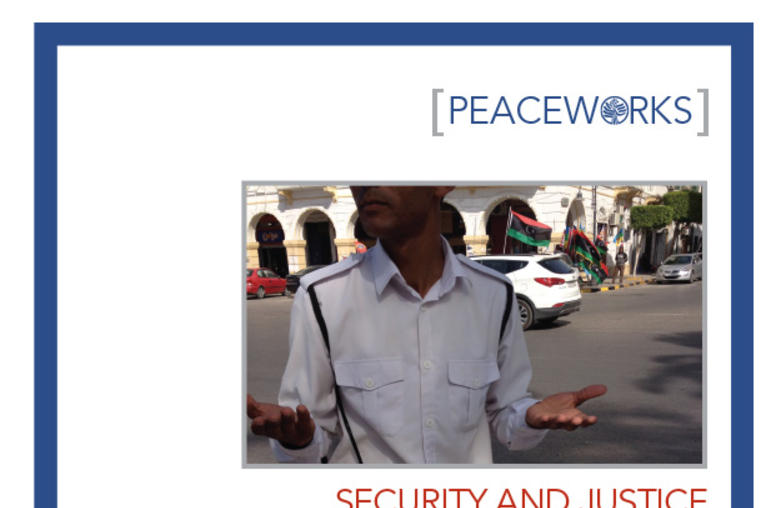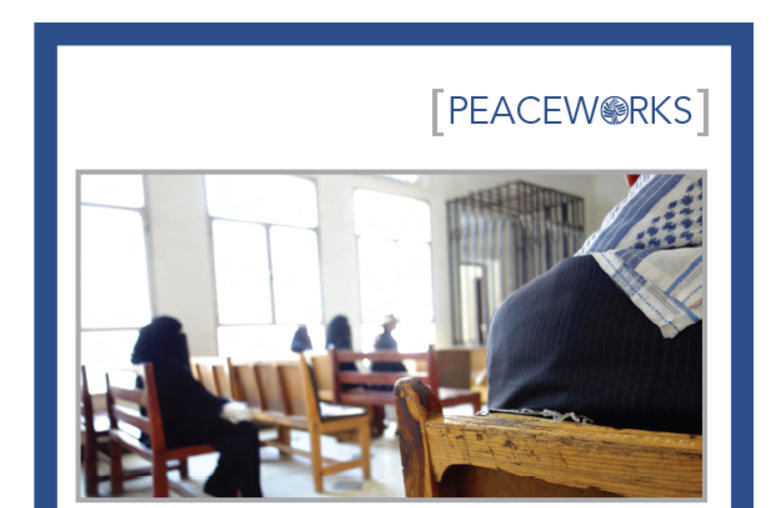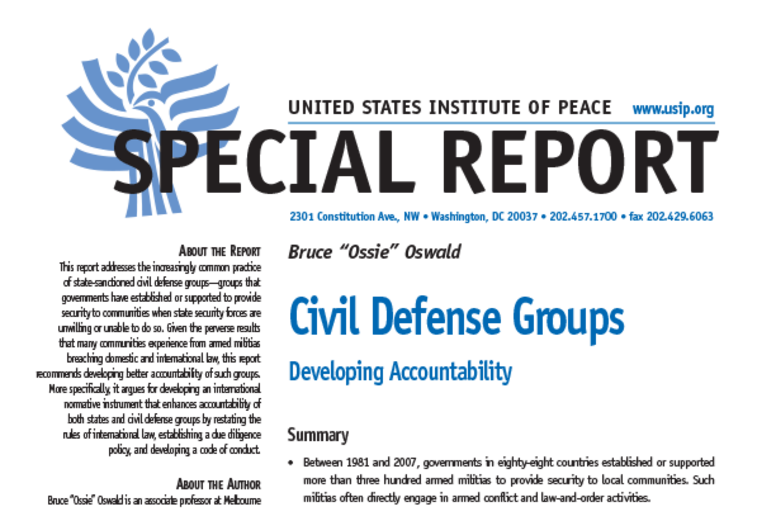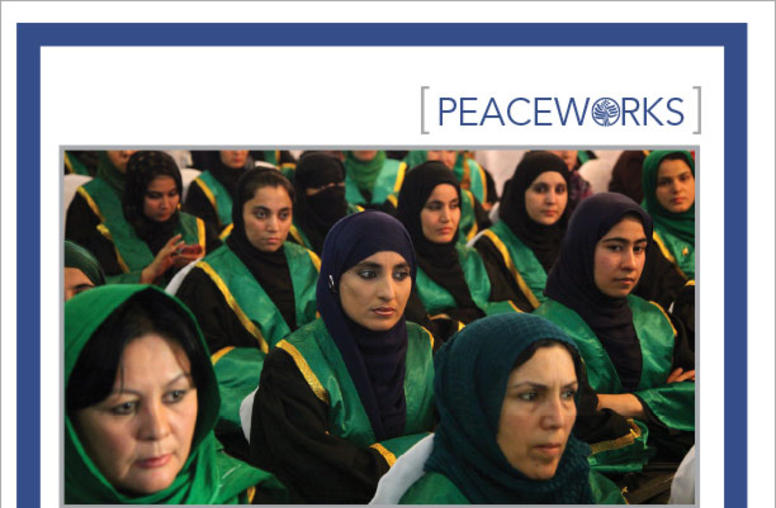Progress and Challenges: The Successor States to Pre-1991 Yugoslavia
Congressional Testimony by Dan Serwer, director of the Balkans Initiative.
The United States has invested upwards of $24 billion in Balkans peace over the past decade, a substantial amount even if it will be dwarfed by spending in Iraq. What can be done to protect the United States' investment in the Balkans and ensure that it pays dividends to the American taxpayer?
On June 25, 2003, Daniel Serwer, director of the Balkans Initiative, testified before the Senate Foreign Relations Committee's Subcommittee on European Affairs on the challenges ahead in the Balkans.
The following is a summary of his statement made before the committee. The views expressed below are those of the author, not the U.S. Institute of Peace, which does not take positions on policy issues.
Mr. Chairman, let me first express to you my appreciation for holding this hearing on the Balkans, even while Washington's attention is focused elsewhere. The United States has invested upwards of $24 billion in Balkans peace over the past decade, a substantial amount even if it will be dwarfed by spending in Iraq. We need to protect our investment and ensure that it pays dividends to the American taxpayer. We also need to draw from the Balkans experience lessons applicable in Afghanistan and Iraq.
There are two important transformations occurring in the Balkans today. The first is a transition away from nationalism, dictatorship, and war towards peace, democracy, and a European future. The second is a shift of responsibility from the United States, which led the Bosnia and Kosovo interventions as well as the fight against Milosevic, to the European Union (EU), which shared leadership with the United States in bringing peace to Macedonia and ultimately must lead the process of European integration for all of the Balkans. The objective of U.S. policy should be to ensure the success of both these processes.
From War to Peace
Let me talk first about the transition within the Balkans, where Croatia, Romania, Bulgaria, and Albania are leading the region towards NATO and the EU by concerted efforts to meet the membership requirements. I might fault each for shortcomings, but their leaderships are trying to match actions to ideals. It is especially important, now that Croatia is becoming a serious candidate for the EU, for Zagreb to arrest all indicted war criminals on its territory and accelerate the return of Serbs to their homes. No member of Partnership for Peace should be harboring an indicted war criminal.
I will not catalogue current problems in the Balkans, which lie mainly in Serbia, Kosovo, Macedonia, and Bosnia, but instead focus on those requiring continued U.S. engagement. Solve these, and we can turn the Balkans over to Europe without endangering our investment.
First, among the problems requiring U.S. attention is security sector reform in Serbia. It is all too clear in the aftermath of Prime Minister Zoran Djindjic's tragic assassination that it was a mistake to leave in place the network of criminals, security forces, businessmen, and politicians that had been the backbone of the Milosevic regime. The crackdown the Serbian government pursued in the aftermath of the assassination should have occurred immediately after the overthrow of Milosevic in October 2000.
Unfortunately, Belgrade's courageous efforts against organized crime are now flagging, human rights standards are being skirted, and the government is abusing its powers, especially in dealing with the press. The United States needs to insist on respect for human rights and on deep reform of the police, army, and security services. While the defense minister seems serious about embarking on the reform process, Belgrade needs to go much farther in dismantling Milosevic's police and secret service apparatus. The United States should be prepared to expand significantly the $110 million or so in assistance that we provide to Serbia, focusing the additional effort specifically on reform of the security services and on the rule of law.
The second problem requiring U.S. attention is final status of Kosovo. Before the end of 2003, the UN Mission in Kosovo will have turned over all but a few powers to the Provisional Institutions of Self-Governance, in accordance with Security Council Resolution 1244. The United Nations will also have succeeded in opening a dialogue between Belgrade and Pristina on practical issues important to both Serbs and Albanians. Serbs have been calling for talks on final status in order to prevent drift into de facto independence and to accelerate Serbia's move toward the EU. The Kosovar Albanians, for their part, want independence and will not sit still forever in an international protectorate.
The U.S. government, in concert with European governments, has so far postponed consideration of final status indefinitely. The administration rightly claims that Kosovo has not yet met all the standards the United Nations has set as preconditions. The crucial shortcoming is in treatment of Serbs and other minorities. The United States should use the influence deriving from its special relationship with the Kosovar Albanians to convince them to allow Serbs and other minorities to return to their homes, worship freely, and travel without harassment or threat. If this happens, final status talks should begin.
It will be difficult to postpone the opening of talks beyond 2005 in any event. Both Serbia and Kosovo will by then have held parliamentary and presidential elections, and both will want the issue settled so that they can pursue closer association with the EU. The United States needs to ready itself for a decision on Kosovo final status. Continuing refusal to face this issue will put us behind the curve, creating serious risks of unrest and instability. Europe cannot be expected to proceed on Kosovo final status without the United States.
The third main issue on which the United States needs to focus is establishment of the rule of law throughout the Balkans. This requires transfer of all those indicted for war crimes to The Hague. We should look to our Italian allies, who now command the Bosnian sector in which both Radovan Karadzic and Ratko Mladic likely appear from time to time, to make these arrests at the earliest opportunity.
Rule of law goes beyond war criminals and touches vital U.S. interests, such as ensuring that the Balkans offer no haven or transit point for international terrorists. Drugs and arms reach Europe from the Balkans and enrich its mafias, and until recently Serbian and Bosnian Serb companies supplied Iraq and Liberia with weapons, contravening UN embargoes. Terror, drugs, and arms are permanent U.S. interests in the Balkans. We should invest in building the institutions required to meet our own security objectives.
Let me make clear what I think we could do less of in the Balkans. The U.S. government should not engage heavily on economic reform and development—the IMF, World Bank, and the EU are vastly better equipped and funded in this area. Likewise, social welfare concerns—while all too real and important—should fall to others. Most of the state-building function—vital because the Balkan wars were due in large part to weak states—should fall to the EU, which will want to shape Balkan states in a European mold. Last but not least, NATO should lead on military reform. The United States should play a role when needed through NATO or in bilateral activities that complement NATO's efforts.
From U.S. to European Leadership
Let me turn to the transfer of leadership to the Europeans, who failed in the Balkans a decade ago but now have another opportunity. Today's Europe is better prepared. It has fielded an excellent team: Paddy Ashdown in Bosnia and Michael Steiner in Kosovo, and Javier Solana, Chris Patten, and Erhard Busek in Brussels. Europe has footed most of the bill for the Balkans, and provides most of the troops—now about 75 percent, vs. 15 percent for the United States. European foreign and security policy, while a shambles on Iraq, persists in the Balkans, as does successful European/American cooperation.
The problem Europe faces is not its limited military capacity, or even its reluctance to use it. There is no Balkans military challenge today that the Europeans cannot handle. The real problem is credibility. The Europeans enjoy little respect—especially among the Albanians, but also among the Serbs and Bosnians—even though they pay the bills and even though the goal for all the peoples of the Balkans is integration within Europe.
To make the vision of a European future more credible, the EU needs to stop treating the Balkans as a distant region to be stabilized and begin to view it as an area into which the EU will soon expand. This shift has already occurred for Romania and Bulgaria, but not for the Western Balkans, where until recently EU plans called for a steady decline in assistance through 2006, to half the level of 2000. At the Thessaloniki Summit last week the EU decided to halt this decline. But it needs to do more. It needs to increase its effort and provide the Western Balkans with structural assistance, which has accelerated economic development in other laggard areas of Europe. This would enhance EU credibility and spur the Balkans to serious reform efforts.
The issue of credibility is not only one of resources and vision. Europe lacks common purpose and unity of command and control. It is easy to play the Europeans off against each other. To the extent they can agree among themselves, the positions they take are often the lowest common denominator. Rarely are they able to deploy all the levers of their considerable power to achieve a result, as Solana did—perhaps unwisely—when he forced Montenegro to stay in a confederation with Serbia. More often, they find it difficult to coordinate economic, political, diplomatic, and military instruments so as to achieve a clearly defined objective. Seldom do they even try. The proposed European Constitution offers some prospect for change, but in the meanwhile Europe needs to focus on improving its performance under the existing legal framework.
The next test for the Europeans is Macedonia, where they have taken over the military task from NATO. The prospects are reasonably good, mainly because the Macedonian and Albanian participants in the new government are fulfilling their commitment to the peace process and at the same time to fighting crime and corruption, which are the greatest threat to the country's viability. Europe needs to focus on making its military mission in Macedonia a success. Then they can and should take over the military mission in Bosnia, assuming the war criminals are in The Hague and NATO has the vexing problem of unifying the Bosnian armed forces on its way to resolution.
Regrettably, Europe and the United States have failed to take one key step towards stabilization of Macedonia: diplomatic recognition by the name its Macedonian and Albanian citizens both prefer. This is a sensitive issue, but it is my hope that the United States will sign a so-called Article 98 agreement with the Republic of Macedonia, exempting U.S. citizens from surrender to the International Criminal Court (ICC). Certainly when it comes to the ICC the United States owes no deference to the EU.
Conclusions
Before concluding, I would like to address two important policy questions:
- What should the United States do about its assistance to Serbia, which has been conditioned on cooperation with the Hague Tribunal?
- What should the United States do about the final status of Kosovo?
The U.S. administration has again certified that Belgrade's cooperation with the Hague Tribunal is sufficient to continue U.S. assistance. I am disappointed that more was not done before the June 15 deadline. There have been a number of high-profile arrests and transfers, but more than a dozen indictees are likely still at large in Serbia. The administration, preoccupied with getting an Article 98 agreement, was unable to obtain substantial support from the Europeans, who provide major benefits to Serbia and have great influence if they choose to use it.
Secretary Powell's decision to continue assistance sets up a showdown for the end of the year: if Congress sticks with its six-month cycle of requiring certification, the next deadline will fall at about the time NATO considers Serbia and Montenegro's application for the Partnership for Peace. The United States and the EU should then insist on transfer of all indictees to The Hague. It is time to complete the process and put this matter behind us.
On Kosovo final status, the United States has tough decisions to make. What solution will it support, and how will it be sold to both Serbs and Albanians? While the Security Council will have to bless a decision on final status, the United States has to decide in what forum it wants the issue negotiated and who will lead the effort. The United States also has to make clear to all that Kosovo's final status will not be allowed to undermine the sovereignty or territorial integrity of Bosnia and Macedonia, where much of our decade-long investment in the Balkans lies. And the United States has to insist on protection of Serbs and other minorities.
The time has come for the United States to signal readiness to consider final status by nominating an American to lead the UN mission in Kosovo. The Europeans have controlled both the civilian and military top jobs in Kosovo for four years. The right American UN chief of mission would be able to do what the Europeans have not done: convince the Albanians that the only way to final status is by correct treatment of Serbs and other minorities. It is especially important to disabuse Pristina of the notion that the United States will unilaterally recognize Kosovo's independence and to convince the Albanians that they have to negotiate with Belgrade in talks sponsored by the EU and United States.
Some will say I am unrealistic, that Albanians and Serbs cannot even talk with each other, much less negotiate their own future, even with U.S. and EU support. My experience says they can. I recently heard—from a multiethnic group the U.S. Institute of Peace trained in Kosovo three years ago at the request of the U.S. Army—that they have founded a professional organization and initiated an impressive range of multiethnic activities. The Institute has conducted for more than a year and a half, with State Department support, dialogues among more than 100 young Serb and Kosovo Albanian political and civil society leaders. In addition to gaining better mutual understanding, they have embarked on joint efforts to encourage voting, counter organized crime, and break the isolation of Serb enclaves in Kosovo. These young people—not the belligerent voices of their elders—are the future of Kosovo and the region. They merit our support and encouragement.
We are today more than midway in the two transitions occurring in the Balkans: closer to peace than war, and closer to European than to U.S. leadership. The right way out of the Balkans is to finish the job, withdrawing U.S. troops and turning the Balkans over to Europe only after the essential remaining tasks have been accomplished: security sector reform in Serbia, a decision on Kosovo final status, and transfer to The Hague of all indicted war criminals.
The views expressed here are not necessarily those of USIP, which does not advocate specific policy positions.



